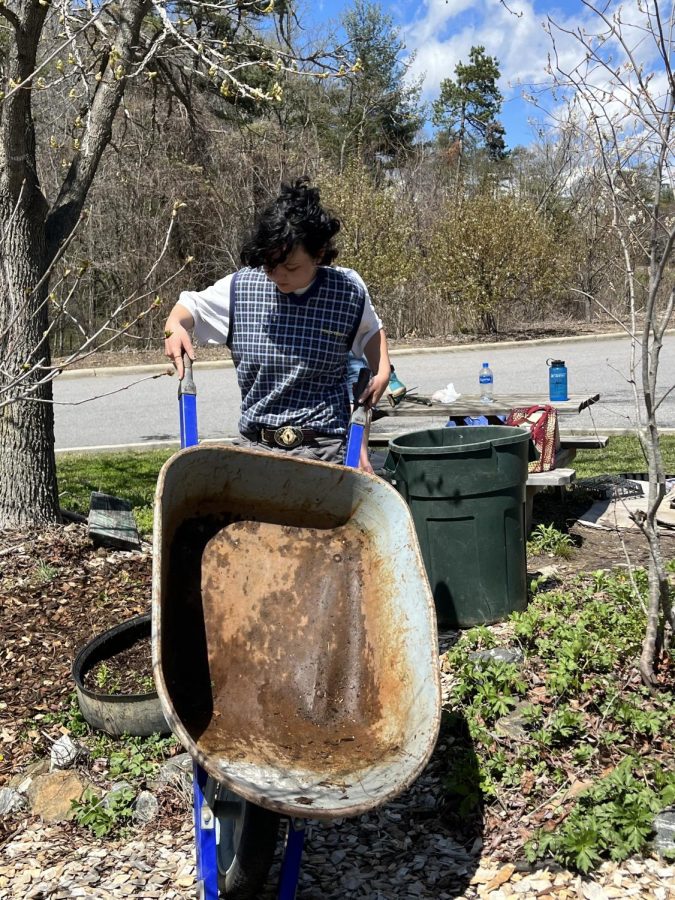The giving gardens help UNCA community
Naomi Todd, Castanea garden manager, participates in a garden workshop day at the Castanea garden.
April 1, 2022
The Student Environmental Center of UNC Asheville, in collaboration with the Grounds department, is responsible for the creation and upkeep of three campus gardens, namely Roots garden, Castanea garden and Sol garden.
The primary role of students within the SEC in relation to the gardens are garden managers. Naomi Todd, Castanea garden manager, highlighted the importance of the SEC’s role within the campus community.
“The SEC is super important, especially because UNCA is always like, we’re the green school of the UNC system,” Todd said.
Evelyn Horton, the Roots garden manager, described the atmosphere and importance of the gardens the SEC manages beyond the material aspects.
“I think there’s so much beauty, I can’t describe it any other way than magic within the garden,” Horton said.
The SEC, a student-run organization, works closely with the Grounds department to maintain gardens, explore new project ideas and ensure things run smoothly. Grounds manager Melissa Acker emphasized the collaboration between the two.
“What we tend to do is to help the students create the space,” Acker said.
Jackie Hamstead is an environmental specialist, interim co-director of sustainability and also serves as the staff advisor to the SEC. Hamstead placed importance and emphasis on the student-run aspect of these gardens, but also the longevity of the gardens.
“I think we try to give the students as much autonomy over the gardens without compromising the original intent of the garden,” Hamstead said.
The actual work that goes into the gardens is done primarily by students, specifically the garden managers, who outside of volunteers, maintain the gardens. These garden managers typically serve about one and a half year terms in these paid positions after working under previous managers as mentees. The garden managers have broad responsibilities, though these are within the scope of the particular garden they manage.
“I basically just take care of the garden. I oversee everything that’s planted. We also work with some food donation stuff, we work with FEI, the Food Equity Initiative,” Todd said.
The FEI utilizes donations from places such as the campus gardens to provide food to those who need it in order to reduce food insecurity on campus.
The SEC in general welcomes community participation in their events and efforts. Specifically within the context of the Roots, Castanea and Sol gardens, Todd said that while the gardens are open to the public and they welcome student participation, it seems that not many people are aware of this.
“I do have work days twice a week that people are welcome to come to, there’s not a ton of people that come just because I don’t think they know where the garden is,” Todd said.
As far as the community aspect, people can come and harvest as they please. This allows for less of a disconnect between the campus community and the Asheville community as a whole.
“We do have areas like here at the Millard, that community members do come through with their baskets and harvest things,” Acker said.
One of the largest and most notable events for the gardens, in part hosted by the SEC, is Greenfest. This semi-annual week of events focuses on nature, community and sustainability. This event is important to the SEC, not only for its goals and efforts, but also for bringing awareness to the gardens and the SEC.
“Probably the biggest thing we do is Greenfest, which is like a week-long thing every semester and we usually have an on-campus workday and that gets people out,” Todd said.
The campus gardens contribute not only to the overall aesthetic of the campus, but also provide students and community members with an opportunity to garden, connect with nature and take food fresh from these gardens.
“Just help people know about the space and the garden and introduce this as a space of, not just a space where you can get food which is awesome, but a space where you can feel safe and welcome and you can relax,” Horton said.


![Brooke Pedersen [second from the right] and Luis Reyes [right] hold banners during the Wrap The Woods event.](https://thebluebanner.net/wp-content/uploads/2025/09/ELIZABETH_PRITCHITT_IMG_3470-1200x804.jpg)
















